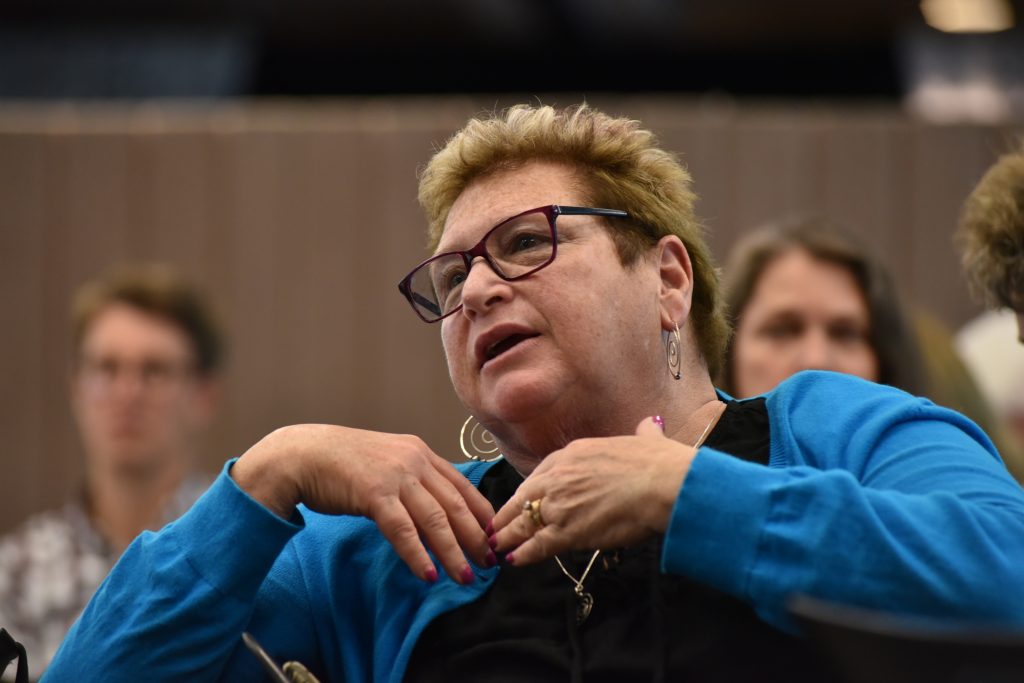 On June 19, 2019, Joanne B. Jarvi, director of business development for Jewish Family Services of Washtenaw County, spoke with Marci Scalera, founding co-chair of the WHI Opioid Project. Scalera, who recently retired from her role as director of clinical and substance use disorder services at the Community Mental Health Partnership of Southeast Michigan, shares her commitment to public health, her history with the WHI, and her hopes for the future.
On June 19, 2019, Joanne B. Jarvi, director of business development for Jewish Family Services of Washtenaw County, spoke with Marci Scalera, founding co-chair of the WHI Opioid Project. Scalera, who recently retired from her role as director of clinical and substance use disorder services at the Community Mental Health Partnership of Southeast Michigan, shares her commitment to public health, her history with the WHI, and her hopes for the future.
Q. What originally inspired your passion for public health?
Scalera. My interest in behavioral health came from a high school psychology class. I was interested in how the brain works. So I studied psychology as an undergrad, with a focus on neuropsych, and my first job was working in community mental health with the geriatric population. After that, I worked as a psychiatric social worker in a psych hospital. Eventually, my work in mental health clinical practice led to work in community mental health administration. In my most recent role, I oversaw and managed all clinical and SUD services–prevention, recovery, and treatment–for the four-county region of Livingston, Washtenaw, Lenawee, and Monroe under the Medicaid program for persons with mental health and substance use disorders. Now, my passion is to ensure that services are available to all individuals with real health needs, including access to care and prevention services in the community, and to ensure that there’s collaboration and partnership across systems.
Q. Which health challenges—disparities, gaps, policies—keep you up at night?
Scalera. Capacity is the highest issue as I see it. That’s one of the things that I worry about. Our region has expanded services through a series of federal grants that have infused funds to improve our service capacity. However, those are time-limited resources. The opiate epidemic has been building over time and because there are a number of folks experiencing addiction, the capacity to treat has not caught up. There needs to be a continuation of funding for all of the service expansions because general funding levels from the past will not cover the need. We have to look at working more efficiently and effectively and we have to fully examine the current need and capacity and look for ways to sustain funding.
Q. What’s your proudest professional accomplishment?
Scalera. I helped to implement a recovery-oriented system of care (ROSC) for substance use disorder. ROSC is a transformational change from a traditional medical model for SUD treatment to one that is recovery focused. The shift includes incorporating peer services at all levels of care. Peers are partners, and have a role to play in services as well as organizational leadership. There are specific principles and elements embedded in this model. The shift includes not only service transformation, but funding models and organization changes.
Q. When and why did you join the WHI, and how has it been helpful?
Scalera. I joined the WHI at its inception. At the time, we thought it was incredible to bring all different stakeholders and disciplines together at multiple levels to really talk about what the issues were and to explore ways to address them as a collaborative effort. One of the things that the WHI was able to do was bring people together. It just so happens we were working on a pre-Affordable Care Act study and that enabled us to really start looking and say wait a minute… We cross paths here; we cross paths there; we really need to come together. So we began a mental health and substance use disorder (MHSUD) work group that brought health care coordinating agencies–in community mental health, substance use disorder, and psychiatry–together to look at ways we could have a better impact.
Q. Who or what inspires you to keep going?
Scalera. So I just retired (laughs). But who inspires me is the persons we serve. The people who need help and the people who give them that help.
